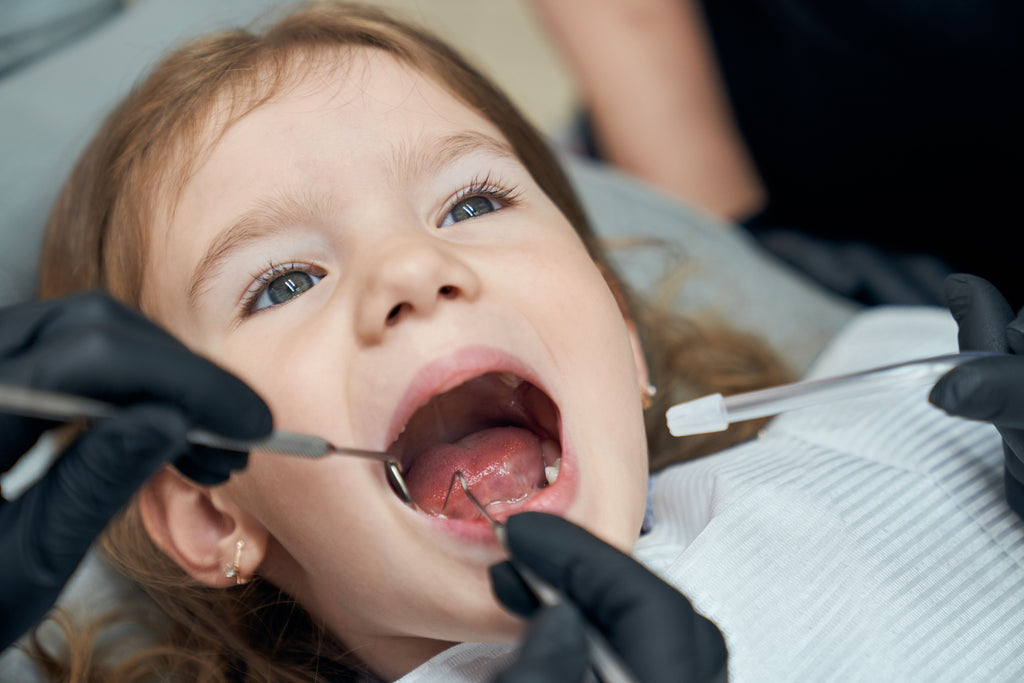How to Choose Your Child's Dentist

Lesley Mcquarrie is both a Certified Dental Assistant, with over 16 years experience, and Certified Holistic Nutritional Consultant. The hour she spent with us was filled with information on the myriad ways we can influence our children's oral health.
We want to keep primary teeth in the mouth - they are important for eating, talking, providing space for the adult teeth to come in and self-image - so we want to dispel the myth that "They're only baby teeth!" and not important to care for.
This post is going to focus on what to look for in a dentist for your child.
Did you know pediatric dentists have an extra 4 years of education over a regular dentist, partially to learn to manage children's behaviour in the office?
You and your child's relationship with your dentist is very important to long-term success. Dentists should be willing to see both of you for a free consultation, called a "Happy Visit," designed for your child to feel comfortable and have positive associations with the dental office and for you to determine whether the dentist's values align with yours.
Success is a positive visit to the dentist, and dental health is a marathon, not a sprint. This is one of your child's first relationships with a medical professional and your ability to feel comfortable asking questions, and being respected is a great way for you to model that relationship and the concept of consent. A medical professional is expected to display the attributes of integrity, compassion, dedication, accountability, honesty, altruism, humility, respect and transparency.
During a visit to the dentist there are a lot of sensory experiences happening for a child. There are new sights, sounds, touches, smells and tastes, but also new vestibular (movement and balance), proprioceptive (where are body is in space) and interoceptive (what's happening inside our bodies eg heart rate, thirst) information to be processed as, for example, the chair is moving up and down or being tipped back, or their heart rate increases with a bit of anxiety. When a child can't make sense of these different aspects of their environment it can manifest as stress, fear and confusion. Someone putting new things in their mouth may feel very different or unsafe.
It is always helpful to tell practitioners what you need them to know to have a successful visit with your child e.g. they have sensory issues, they really don't like bright lights, they have autism, etc.
You should always be welcome in the room when your child is having an exam. It is a good conversation to have with the dentist ahead of time so you both know what the expectation will be.
At a regular dental visit, the dentist will look for a lot of things other than just cavities. This will include a soft tissue exam, checking for jaw alignment and overall mouth health.
Cavities happen! The dental team will not be judging you or your parenting if your child has a cavity. Remember we are working on building great habits and relationships.
When should you intervene when your child is having an emotional issue/feeling distressed?
You can tell the dentist when you feel your child needs a break - this is teaching a form of consent. It won't always be able to happen immediately, depending on what type of procedure the dentist is doing, but the dentist will mostly be able to take breaks at some point during any type of exam or procedure.
Success will begin before you ever get to the dental office. Your child will pick up on your emotional cues. If you are anxious on the way to the dentist they will pick up on that and you might unintentionally pass on your fears to them. Speak calmly, breathe slowly, make it playful and relaxed. Also, watch to see if the dentist is playful and relaxed with your child. Starting this important relationship off well can be fun and easy and will be one of the most important ways you can help ensure a lifetime of good oral health for your child.
Contributed by Shauna Farrell
Image by ArtPhoto_studio on Freepik
